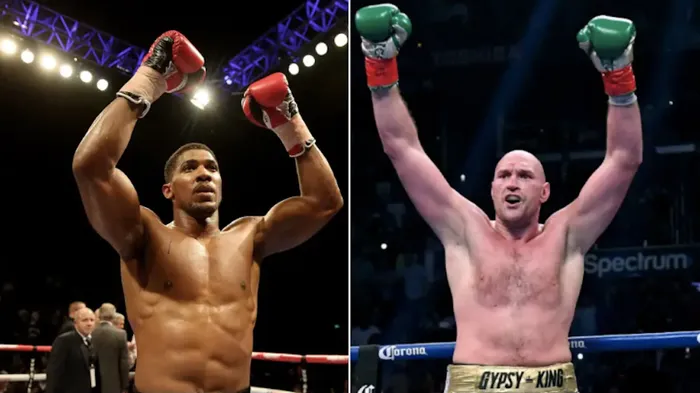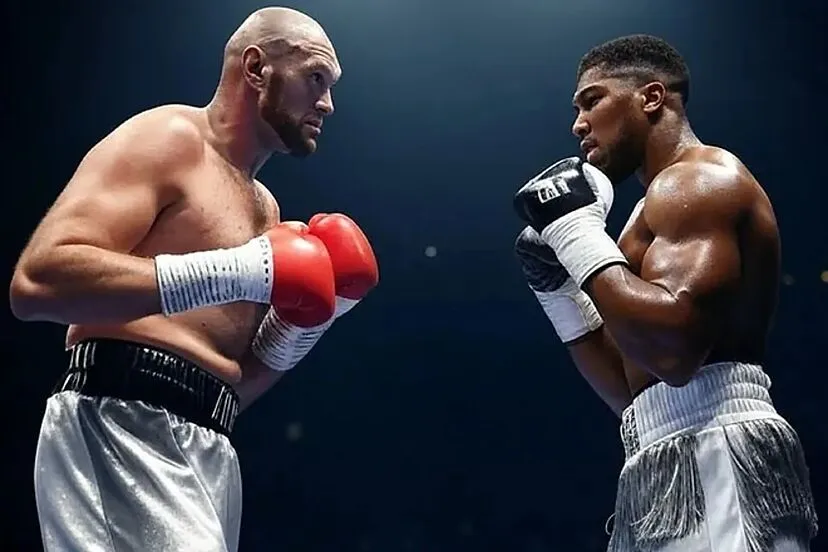For nearly a decade, boxing fans have dreamed of a blockbuster showdown between Anthony Joshua and Tyson Fury—two British heavyweight giants whose careers have run parallel but never intersected inside the ropes. Their rivalry is arguably the most tantalizing “what-if” in modern boxing history. Yet, despite headlines, negotiations, and constant hype, a fight between these two champions has never materialized. Now, as time passes and questions mount, fans are divided: Is Joshua a media-created fraud who ducked real threats? Or is Fury a self-protecting coward hiding behind mind games and PR spin?
This article dives into the uncomfortable truths, broken negotiations, psychological warfare, and media manipulation that have shaped this never-ending saga. More importantly, it confronts the growing belief that boxing’s most anticipated fight may have been nothing more than a hype-fueled illusion.
Anthony Joshua’s media-driven rise: Talent or tailored brand?
When Anthony Joshua burst onto the professional scene after his 2012 Olympic gold medal, he was instantly positioned as boxing’s next global superstar. With a chiseled physique, knockout power, and a humble demeanor, Joshua quickly became a marketing dream, signing multi-million-pound sponsorships with Under Armour, Beats by Dre, and Lucozade. Promoter Eddie Hearn built an empire around him, and the British public ate it up.

But as his resume grew—beating Dillian Whyte, Charles Martin, Wladimir Klitschko, and Joseph Parker—so did murmurs of concern. Critics began to question whether Joshua’s matchmaking was too careful. Some fights, like against Klitschko, were classics, but others felt manufactured to maintain momentum and protect the brand. His 2019 upset loss to Andy Ruiz Jr. shattered the illusion, exposing vulnerability in both chin and tactics.
Though Joshua won the rematch against Ruiz and put up a valiant effort in two losses to Oleksandr Usyk, questions about his mental strength and adaptability persist. Is he the elite heavyweight his résumé suggests? Or a well-marketed fighter whose legacy is more about image than ring greatness?
Even now, many believe Joshua’s team has long avoided the Fury fight, preferring commercially safe bouts over dangerous showdowns that risk the empire they’ve built.
Tyson Fury’s erratic path: Genius, mind games, or calculated avoidance?
Tyson Fury, on the other hand, has always walked the tightrope between brilliance and chaos. The self-proclaimed “Gypsy King” shocked the world in 2015 when he dethroned Wladimir Klitschko in a tactical masterclass. But his subsequent battles with addiction, mental health, and ballooning weight derailed his career for nearly three years.
Fury returned in 2018, underwent a dramatic transformation, and reestablished himself with a trilogy against Deontay Wilder. He showcased unmatched movement, power, and ring IQ, reminding the world that a healthy Fury is arguably the most complete heavyweight alive.
But behind the accolades and charisma, Fury’s reputation has also come under fire. He’s repeatedly walked away from negotiations, retired only to unretire, and publicly contradicted himself about potential matchups. Fans have grown tired of his erratic behavior, which many now believe is part of a deliberate strategy to duck dangerous fights—including against Joshua and even Usyk.
He’s called Joshua a “bodybuilder” and “useless dosser,” yet every time the fight edges closer to reality, Fury retreats with new demands, deadlines, or distractions. Is it psychological warfare? Or is Fury carefully crafting an undefeated record by picking his moments and avoiding peak threats?
The failed negotiations: A timeline of excuses and deception
There have been at least four major attempts to make the Fury vs. Joshua fight happen, all of which crumbled under the weight of greed, ego, and conflicting agendas.
2018–2019: When both were undefeated champions, talks were derailed by Fury’s ESPN deal and rematch obligations with Wilder.
2020–2021: Following Fury’s second win over Wilder and Joshua’s defeat of Kubrat Pulev, fans were told the fight was “signed” for Saudi Arabia. But an arbitration ruling forced Fury into a third Wilder fight, and the superfight collapsed.
2022: Joshua lost twice to Usyk, but Fury still called him out. Offers were made and deadlines imposed by Fury, which many saw as tactics to avoid real negotiations.
2023–2024: Despite social media hype, negotiations again failed, with Fury publicly blaming Joshua for “not signing the contract fast enough”—a pattern Fury has repeated with Usyk as well.
Each time, the public was left confused and disappointed. Who was at fault? Joshua’s camp, with its long contracts and commercial protections? Or Fury, with his moving goalposts and last-minute backouts? Both sides claim innocence, but fans are no longer buying it.
Fury’s mind games vs. Joshua’s corporate silence
Fury’s weapon of choice has always been words. He’s a master of psychological warfare, disarming opponents with humor one moment and attacking their credibility the next. His treatment of Joshua has followed this playbook: call him names, question his courage, then offer a fight under unrealistic terms.
Joshua, by contrast, has adopted a corporate, almost sterile approach. He rarely engages in trash talk and often appears as though his statements have passed through a PR team. While some fans admire his professionalism, others see it as a lack of fire—proof that he’s not mentally built for high-stakes rivalries like Fury.
But the silence can also be strategic. Joshua may be playing the long game, biding his time for a final cash-out fight when the public demands it most. Or perhaps he and his team truly believe Fury is not a serious negotiating partner. Either way, this silence has allowed Fury to control the narrative, painting Joshua as the avoidant party even when the facts are murky.
The dirty truth: Boxing’s business model rewards inaction
The Fury-Joshua saga exposes the harsh reality of modern boxing. Unlike other sports, boxing lacks a unified governing body to force top fighters to compete. Promoters, networks, and sanctioning bodies all have conflicting incentives, and often, keeping fighters apart is more profitable than making the biggest fights happen.
In this world, hype is currency, and both Joshua and Fury have become millionaires many times over by simply teasing a fight. Why risk it all when pay-per-views, endorsements, and legacy can be managed through storytelling and delay?
The sad truth is this: both men may have benefited more from not fighting each other than from stepping into the ring. And boxing fans—hungry, loyal, and vocal—are the ones paying the price.

Fan backlash: The cost of deception is credibility
In recent years, fans have grown increasingly cynical. No longer satisfied with press conferences and social media callouts, they demand contracts signed and fists thrown. The repeated collapse of Fury vs. Joshua has worn thin, and both fighters have taken hits to their reputations.
Joshua is now viewed by some as a fragile ego with a fragile chin, more invested in rebuilding his image than chasing glory. Fury, once beloved for his authenticity, now risks being labeled a manipulative opportunist—a man who ducks when it suits him and hides behind theatrics.
The stakes are high. If the fight never happens, both will carry the burden. Joshua’s critics will say he never wanted the smoke. Fury’s detractors will claim he never intended to fight anyone outside his comfort zone. Their legacies will forever be incomplete—a haunting footnote in boxing history.
Final Thoughts: Who’s ducking who?
Is Anthony Joshua a fraud built by marketing and protected matchmaking? Or is Tyson Fury a coward cloaked in charisma, dodging the one fight that could expose him?
The truth probably lies somewhere in between. Joshua has been too careful, Fury too chaotic. And while both men have shown greatness in the ring, their failure to face each other is a stain that grows darker with time.
As younger contenders like Jared Anderson, Daniel Dubois, and Filip Hrgović rise, the window for this historic fight is closing. Unless egos are dropped and real negotiations begin, the Joshua vs. Fury dream may remain just that—a dream sold for pay-per-view dollars, never destined to become reality.





